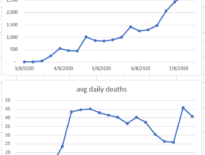
Photo credit: Flickr / SELF Magazine, Creative Commons Attribution 2.0 Generic license
Tuesday, September 8, 2020
With fall almost upon us, patients are abuzz with questions about this season’s flu shot. Below I try to answer the questions they should be asking.
I hear the flu shot is especially important this year because of the coronavirus pandemic.
That’s not a question. I thought I was going to be answering questions. Is this a rambling stream of consciousness post, or a question and answer post?
Wow. You really need more coffee. OK. How about this? Will the flu shot protect me from the novel coronavirus?
No. It will protect you from influenza.
I see. But if I get COVID, will the flu shot make it a milder illness?
No. If you get influenza the flu shot will make it a milder illness. The vaccine protects from influenza. The influenza virus and the coronavirus are in totally different families of viruses.
Then why is everyone making such a big deal about making sure I get my flu shot this year?
Well, it’s less about individual patients than about the healthcare system in general. We really don’t want to be juggling two serious respiratory illness outbreaks at the same time. It’s not that one illness interacts with the other, it’s that if we’re seeing lots of flu patients and lots of COVID patients the same week our ER and hospital beds will fill up. So we’d love to see as little flu this season as possible.
Aren’t COVID and flu treated the same?
No. For influenza we have oseltamivir (Tamiflu) and baloxavir (Xofluza) which can shorten the illness duration and prevent complications in high-risk patients. For COVID-19 we have no proven therapy for outpatients, but solumedrol and remdesivir have been shown to help hospitalized patients. That’s part of the logistical problem. If an ER doctor sees a patient with a fever and a cough today, she can assume the patient has COVID-19 and do testing just for confirmation. But in December, she’ll have to test both for flu and COVID. Given that the best test for COVID has a false-negative rate of about 20%, that will lead to a lot of uncertainly about diagnosis and treatment. So we’d love to see as little flu this season as possible.
Who should get the flu shot?
The flu shot is recommended for everyone over 6 months who doesn’t have a specific contraindication, like an allergic reaction to a previous flu shot. I usually urge patients at highest risk to get it – people over 65, people with lung and heart disease, pregnant women, and people who live or care for folks in the previous groups. But this year I’m asking everyone to get it, because we’d love to see as little…
See as little flu this season as possible. Yeah, I get it. Any special consideration for older patients?
Yes. There are two important points for patients 65 and over. The first is that there is a special high-dose influenza vaccine that is approved especially for people 65 and over. Older people sometimes produce inadequate quantities of antibodies in response to the standard vaccine, so the higher dose helps generate the amount of antibodies required for immunity. Older patients can receive either vaccine, but this year I’m making a point to remind older patients to get the high-dose vaccine. Of course, getting the standard vaccine is better than no vaccine at all.
And the second point?
Huh? Oh, right. The second important point for folks 65 and over is the timing of the vaccine. Younger patients can get the flu shot immediately, because they usually mount a longer-lasting antibody response. (And our office has the standard dose flu shot, so please come and get it, younger patients.) But older patients’ immune response frequently fades after a several months, so it’s recommended that they receive the vaccine in October so that they are still protected in January and February. (I’ll email our older patients when we receive the high-dose vaccine.) Again, getting it too early or too late is much better than not getting it.
Do you have any seasonal thoughts about contrasts between the Gregorian and Hebrew calendars?
Yes, actually. Rosh Hashana, the Jewish New Year, is next week, and I must say that starting a new year in autumn feels much more natural than in January. The Hebrew calendar is obviously tied to agriculture, but you don’t have to be a farmer to feel the sense of a new year starting now. The school year starts in the fall; the fiscal year starts in the fall. In fall Nature declares “You have finished a loop around the Sun. A new loop is starting now. Take note.” Nothing that lasts a year starts in January. Why are we talking about this?
I just thought you might want to offer readers good wishes for the coming year.
Oh, that’s so thoughtful. And, listen, I’m sorry for snapping at you at the beginning of the post.
Don’t worry about it. We’ve all been under a lot of pressure.
Thanks. So, whether you’re celebrating or not, please accept my wishes for a year of good health, prosperity, and peace. And please get a flu shot.
Learn more:
Pandemic Guidance – Vaccination Guidance During a Pandemic (Centers for Disease Control and Prevention)
Pandemic makes flu shots vital this season. Health officials aim for easier, safer ways for you to get the vaccine. (Washington Post)
Can You Get a Flu Shot Now? Yes, and Doctors Say You Should (New York Times)

